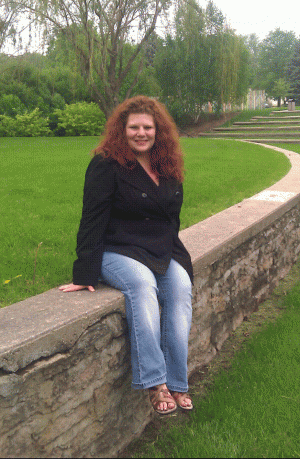
Assistant Professor of English Missouri Western State University;
Director, Prairie Lands Writing Project
- The Nebraska Writing Project Produces Teacher-Leaders:
Susan’s Selected Accomplishments - “The Best Teacher of Writing is a Writer Herself"
- Helping Students “Improve Their Writing in a Supportive Context With Other Practicing Writers”
- Developing as a Teacher-Leader and Professional
- Benefiting from “Teachers Forming Networks With Other Teachers and Drawing On Collective Expertise”
- “Teachers Provide the Best Instruction for Other Teachers”
Susan’s Involvement with the Nebraska Writing Project:
- Member of Nebraska Writing Project Advisory Board
- NeWP Co-Director (2006-2010)
![“[The Nebraska Writing Project] changed my life; it changed my teaching; and it changed my personal life; it changed everything. I still marvel at its capacity to do that”](MartensQ2.png)
- Founder and Facilitator of the Nebraska Writing Project’s writing marathon program
(2006 –present). - Nebraska Writing Project Summer Institute Co-Facilitator (2006, 2010)
- Nebraska Writing Project Literature Institute Co-Facilitator (2009)
Susan’s Involvement with the National Writing Project
- Past Presenter at the National Writing Project Convention (2009)
- Invited to attend Professional Writing Retreat. Santa Fe, (2008)
- Invited to attend Tech Matters Institute, California State University, (2007)
- Past Presenter at the National Writing Project Technology Institute (2007)
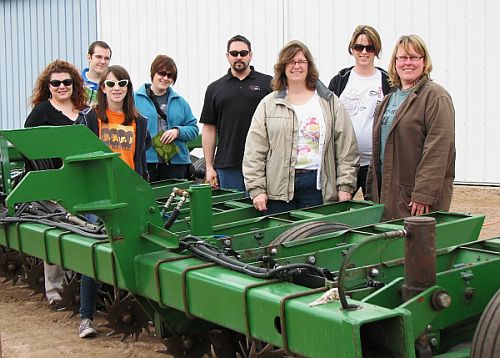
The Nebraska Writing Project Produces Teacher-Leaders:
Susan’s Selected Accomplishments:
- “Eight Stories about Teaching I Never Told You. What Teaching Means. Eds. Daniel Boster and Marni Valario. Rogue Faculty Press (forthcoming, Spring 2012).
- Hough Junior Staff Teaching Award, Department of English, UNL, 2011.
- Honorable Mention in the Edwin M. Hopkins Award competition (for articles by someone who is not presently a secondary school teacher and published in Volume 98 or 99 of English Journal).
- “Navigating the Tensions in Designing a Professional Writing Retreat.” National Writing Project. July 2010.
- John W. Robinson Prize for best graduate student scholarly essay, Department of English, UNL, 2010.
- “Fantasy Island Meets the Real World: Using Online Discussion Forums in Collaborative Learning.” English Journal. May 2009: 88-98.
“The Best Teacher of Writing is a Writer Herself:
- When teachers are themselves writers, their work becomes more genuine and “students can tell, without a doubt, when you’re faking it. I am not faking it. I really care about writing. I am a writer myself; I know how hard it is. I think that just infuses the teaching.”
- As a writer herself, Susan has implemented and popularized writing marathons as a pedagogical tool for teachers of writing and developed numerous writing retreats in which
- Nebraska Writing Project teachers have participated.
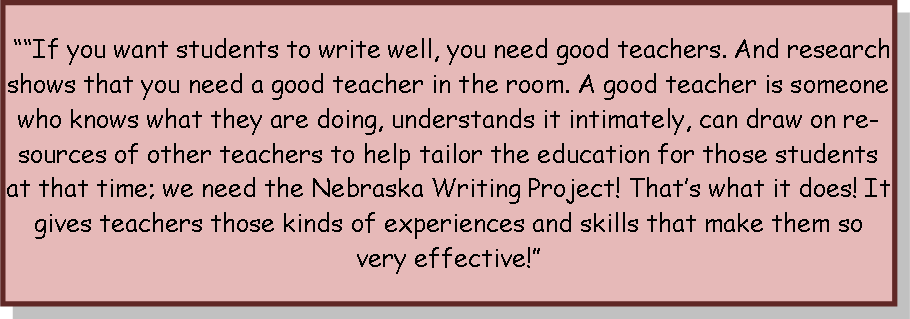
Helping Students “Improve Their Writing in a Supportive Context With Other Practicing Writers”:
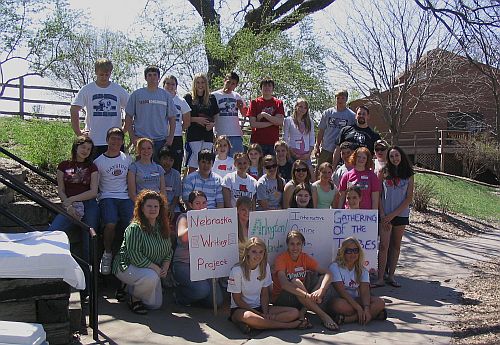
As a direct result of her participation in her very first Summer Institute, Susan was able to form a close collegial relationship with a teacher from nearby Ashland-Greenwood High School, Jeff Grinvalds. Together Susan and Jeff constructed a collaborative project which, through the use of online forums and face-to-face meetings, allowed two years of their students, to collaborate on Lord of the Flies projects. “The project:
- Encouraged students to think about how they could and were communicating, through writing, with colleagues (other students) about their ideas.
- Taught students “rhetorical strategizing” as they considered their audience, the medium in which they were working, and their purpose in communicating
- Helped students gain leadership experience as each student was responsible for facilitating and managing online discussion for a particular piece of the group’s larger project.
- Allowed students to gain “real world” writing, thinking, and collaborative skills as the kind of work they were asked to do, and the way in which they did it, mirrored the online collaborative work many professionals do on a daily basis.
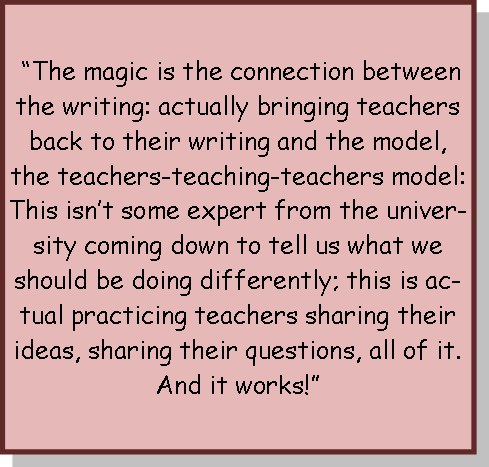
Developing as a Teacher-Leader and Professional:
- After participating in several NeWP Institutes, through the fellow students she met and the encouragement of University faculty, Susan was able to see herself as a “Ph.D. student” and as result is now pursuing her Ph.D. at UNL in Rhetoric and Composition. After completing her degree she hopes to work full-time within National Writing Project
- Or based on her own extensive teaching experience, work with and facilitate programs for students studying to become teachers and educators who are already teaching in the classroom.
Benefiting from “Teachers Forming Networks With Other Teachers and Drawing On Collective Expertise”:
Connecting with teachers at various levels, through the Nebraska Writing Project, has allowed Susan to:
- Learn from what teachers at the younger grade levels are doing with writing instruction and thus better tailor her own instruction based on the curriculum to which she imagines her students have already been exposed.
- Look differently at University-level researchers and faculty to see and form a collaborative relationship with them, rather than the contentious one she feels many teachers have as they may see these researchers not as teachers too, but as “disdainful” or “better than us.”
- Learn from “elementary teachers, middle school, high school, and college teachers who are all teaching writing.” From these teachers she has, “buckets of great ideas she has gotten from her elementary writing teacher friends, that are perfectly applicable in the college classroom.”
- Network with other teachers at other schools to brainstorm teaching ideas, outside of the context of her own department politics, and is thus able to learn from these teachers how they negotiate professional conflicts in their own situations.
“Teachers Provide the Best Instruction for Other Teachers”:
- “The magic is the connection between the writing: actually bringing teachers back to their writing and the model, the teachers-teaching-teachers model: This isn’t some expert from the university coming down to tell us what we should be doing differently; this is actual practicing teachers sharing their ideas, sharing their questions, all of it. And it works!”
- “If you want students to write well, you need good teachers. And research shows that you need a good teacher in the room. A good teacher is someone who knows what they are doing, understands it intimately, can draw on resources of other teachers to help tailor the education for those students at that time; we need the Nebraska Writing Project! That’s what it does! It gives teachers those kinds of experiences and skills that make them so very effective!”
- “If we want the next generation of professionals, parents, and community members to be able to improve their community, improve the country, do the hard work of keeping a society together and not falling into chaos, we have to know how to communicate with each other and writing is a huge part of that!” And the Nebraska Writing Project helps teachers teach this critical skill effectively.